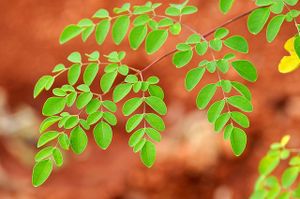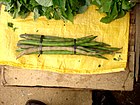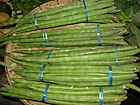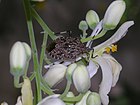Note: This is a project under development. The articles on this wiki are just being initiated and broadly incomplete. You can Help creating new pages.
Difference between revisions of "Moringa oleifera - Drumstick"
Chaithrika (talk | contribs) (Created page with "thumb|right|''Moringa oleifera'', ''(Nugge soppu)'' '''Moringa oleifera''' is the most widely cultivated species of the genus Moringa, w...") |
|||
| (41 intermediate revisions by 3 users not shown) | |||
| Line 1: | Line 1: | ||
| − | [[File:7561107678 2e8fb3110e z.jpg|thumb|right|''Moringa oleifera'', '' | + | [[File:7561107678 2e8fb3110e z.jpg|thumb|right|''Moringa oleifera'', ''Nugge soppu'']] |
| + | '''Moringa oleifera''' is the most widely cultivated species of the genus Moringa, which is the only genus in the family Moringaceae. This plant is belongs Moringaceae family. <ref name="Plant family"/> | ||
| + | ==Uses== | ||
| + | {{Uses|Arthritis}}, {{Uses|Joint pain}}, {{Uses|Asthma}}, {{Uses|Cancer}}, {{Uses|Diabetes}}, {{Uses|Constipation}}, {{Uses|Epilepsy}}, {{Uses|Diarrhea}}, {{Uses|Stomachache}}. | ||
| + | ==Parts Used== | ||
| + | {{Parts Used|Leaves}}, {{Parts Used|Flowers}}, {{Parts Used|Pods}}, {{Parts Used|Seeds}}. | ||
| − | + | ==Chemical Composition== | |
| + | Investigation of the carotenoid contents from the leaves, flowers and fruits of eight M. oleifera cultivars from India yielded luteoxanthin, lutein, zeaxanthin, and β-carotene.<ref name="chemical composition"/> | ||
| + | ==Common names== | ||
| + | {{Common names|kn=Nuggekayee|ml=Muringa|sa=|ta=Murungai Maram|te=Munagachettu|hi=Sahjan|en=Drumstick}} | ||
| − | == | + | ==Properties== |
| + | Reference: Dravya - Substance, Rasa - Taste, Guna - Qualities, Veerya - Potency, Vipaka - Post-digesion effect, Karma - Pharmacological activity, Prabhava - Therepeutics. | ||
| + | ===Dravya=== | ||
| − | + | ===Rasa=== | |
| − | + | Tikta (Bitter), Katu (Pungent) | |
| − | + | ===Guna=== | |
| − | + | Laghu (Light), Ruksha (Dry), Tikshna (Sharp) | |
| − | + | ===Veerya=== | |
| − | + | Ushna (Hot) | |
| − | + | ===Vipaka=== | |
| − | + | Katu (Pungent) | |
| − | + | ===Karma=== | |
| − | + | Kapha, Vata | |
| + | ===Prabhava=== | ||
| + | ==Habit== | ||
| + | {{Habit|Small tree}} | ||
| + | |||
| + | ==Identification== | ||
| + | ===Leaf=== | ||
| + | {{Leaf|Simple|Tri-pinnate|Leaf Arrangement is Alternate-spiral and Leaf Shape is Ovate or elliptic}}<ref name="Leaf"/> | ||
| + | |||
| + | ===Flower=== | ||
| + | {{Flower|Unisexual|Flower borne on a false pedicel 7-15 mm|White to cream|5|In axillary, divaricate panicles; white. Flowering throughout the year}} | ||
| + | |||
| + | ===Fruit=== | ||
| + | {{Fruit|Elongate||Torulose capsule, angled, longitudinally 3-valved; seeds many, 3 angled, 3 winged. Fruiting throughout the year|Bark corky grey|Many seeds}} | ||
| + | |||
| + | ===Other features=== | ||
| + | |||
| + | ==List of Ayurvedic medicine in which the herb is used== | ||
| + | * [[Aragwadhadi kashayam]] | ||
| + | * [[Shothaghna lepa]] | ||
| + | <ref name="Ayurvedic preparations"/> | ||
| + | |||
| + | ==Where to get the saplings== | ||
| + | ==Mode of Propagation== | ||
| + | {{Propagation|Seeds}}, {{Propagation|Cuttings}}. | ||
| + | |||
| + | ==How to plant/cultivate== | ||
| + | Moringa seeds can be planted directly where intended to be grown. No pretreatment is required. Cuttings take root very easily and even large branches can be planted and they will sprout.<ref name="How to plant/cultivate"/> | ||
| + | |||
| + | ==Commonly seen growing in areas== | ||
| + | {{Commonly seen|Tropical area}}, {{Commonly seen|Subtropical area}}, {{Commonly seen|Equatorial climate areas}}. | ||
| + | |||
| + | ==Photo Gallery== | ||
| + | <gallery class="left" caption="" widths="140px" heights="140px"> | ||
| + | Ben-oil tree leaves (marketed) 1.jpg | ||
| + | Ben-oil tree leaves (marketed) 2.jpg | ||
| + | Ben-oil tree pods (marketed) 1.jpg | ||
| + | Ben-oil tree pods (marketed) 2.jpg | ||
| + | Bug on moringa.JPG | ||
| + | </gallery> | ||
| + | |||
| + | ==References== | ||
| + | <references> | ||
| + | <ref name="chemical composition">[https://www.researchgate.net/publication/280575461_Chemical_Constituents_of_Moringa_oleifera_Lam_Leaves Chemical Constituents]</ref> | ||
| + | <ref name="Leaf">[http://eol.org/pages/486251/details Encyclopedia of life]</ref> | ||
| + | <ref name="Ayurvedic preparations">[https://easyayurveda.com/2012/12/06/moringa-benefits-medicinal-usage-complete-ayurveda-details/ Ayurvedic preparations]</ref> | ||
| + | <ref name="How to plant/cultivate">[https://treesforlife.org/our-work/our-initiatives/moringa/how-to-grow Cultivation details]</ref> | ||
| + | <ref name="Plant family">Karnataka Aushadhiya Sasyagalu By Dr.Maagadi R Gurudeva, Page no:205</ref> | ||
| + | </references> | ||
| + | |||
| + | ==External Links== | ||
| + | * [https://www.feedipedia.org/node/124 Moringa oleifera on feedipedia.org] | ||
| + | * [https://www.sciencedirect.com/science/article/pii/S2213453016300362 Moringa oleifera on sciencedirect.com] | ||
| + | * [https://pubmed.ncbi.nlm.nih.gov/17089328/ Moringa oleifera on pubmed.ncbi.in] | ||
| + | |||
[[Category:Herbs]] | [[Category:Herbs]] | ||
| + | [[Category:Ayurvedic herbs that don't have seed photos]] | ||
| + | [[Category:Moringaceae]] | ||
Latest revision as of 12:39, 11 August 2020
Moringa oleifera is the most widely cultivated species of the genus Moringa, which is the only genus in the family Moringaceae. This plant is belongs Moringaceae family. [1]
Contents
- 1 Uses
- 2 Parts Used
- 3 Chemical Composition
- 4 Common names
- 5 Properties
- 6 Habit
- 7 Identification
- 8 List of Ayurvedic medicine in which the herb is used
- 9 Where to get the saplings
- 10 Mode of Propagation
- 11 How to plant/cultivate
- 12 Commonly seen growing in areas
- 13 Photo Gallery
- 14 References
- 15 External Links
Uses
Arthritis, Joint pain, Asthma, Cancer, Diabetes, Constipation, Epilepsy, Diarrhea, Stomachache.
Parts Used
Chemical Composition
Investigation of the carotenoid contents from the leaves, flowers and fruits of eight M. oleifera cultivars from India yielded luteoxanthin, lutein, zeaxanthin, and β-carotene.[2]
Common names
| Language | Common name |
|---|---|
| Kannada | Nuggekayee |
| Hindi | Sahjan |
| Malayalam | Muringa |
| Tamil | Murungai Maram |
| Telugu | Munagachettu |
| Marathi | NA |
| Gujarathi | NA |
| Punjabi | NA |
| Kashmiri | NA |
| Sanskrit | |
| English | Drumstick |
Properties
Reference: Dravya - Substance, Rasa - Taste, Guna - Qualities, Veerya - Potency, Vipaka - Post-digesion effect, Karma - Pharmacological activity, Prabhava - Therepeutics.
Dravya
Rasa
Tikta (Bitter), Katu (Pungent)
Guna
Laghu (Light), Ruksha (Dry), Tikshna (Sharp)
Veerya
Ushna (Hot)
Vipaka
Katu (Pungent)
Karma
Kapha, Vata
Prabhava
Habit
Identification
Leaf
| Kind | Shape | Feature |
|---|---|---|
| Simple | Tri-pinnate | Leaf Arrangement is Alternate-spiral and Leaf Shape is Ovate or elliptic |
Flower
| Type | Size | Color and composition | Stamen | More information |
|---|---|---|---|---|
| Unisexual | Flower borne on a false pedicel 7-15 mm | White to cream | 5 | In axillary, divaricate panicles; white. Flowering throughout the year |
Fruit
| Type | Size | Mass | Appearance | Seeds | More information |
|---|---|---|---|---|---|
| Elongate | Torulose capsule, angled, longitudinally 3-valved; seeds many, 3 angled, 3 winged. Fruiting throughout the year | Bark corky grey | Many seeds | {{{6}}} |
Other features
List of Ayurvedic medicine in which the herb is used
Where to get the saplings
Mode of Propagation
How to plant/cultivate
Moringa seeds can be planted directly where intended to be grown. No pretreatment is required. Cuttings take root very easily and even large branches can be planted and they will sprout.[5]
Commonly seen growing in areas
Tropical area, Subtropical area, Equatorial climate areas.
Photo Gallery
References
- ↑ Karnataka Aushadhiya Sasyagalu By Dr.Maagadi R Gurudeva, Page no:205
- ↑ Chemical Constituents
- ↑ Encyclopedia of life
- ↑ Ayurvedic preparations
- ↑ Cultivation details
External Links
- Ayurvedic Herbs known to be helpful to treat Arthritis
- Ayurvedic Herbs known to be helpful to treat Joint pain
- Ayurvedic Herbs known to be helpful to treat Asthma
- Ayurvedic Herbs known to be helpful to treat Cancer
- Ayurvedic Herbs known to be helpful to treat Diabetes
- Ayurvedic Herbs known to be helpful to treat Constipation
- Ayurvedic Herbs known to be helpful to treat Epilepsy
- Ayurvedic Herbs known to be helpful to treat Diarrhea
- Ayurvedic Herbs known to be helpful to treat Stomachache
- Herbs with Leaves used in medicine
- Herbs with Flowers used in medicine
- Herbs with Pods used in medicine
- Herbs with Seeds used in medicine
- Herbs with common name in Kannada
- Herbs with common name in Hindi
- Herbs with common name in Malayalam
- Herbs with common name in Tamil
- Herbs with common name in Telugu
- Herbs with common name in English
- Habit - Small tree
- Index of Plants which can be propagated by Seeds
- Index of Plants which can be propagated by Cuttings
- Herbs that are commonly seen in the region of Tropical area
- Herbs that are commonly seen in the region of Subtropical area
- Herbs that are commonly seen in the region of Equatorial climate areas
- Herbs
- Ayurvedic herbs that don't have seed photos
- Moringaceae





